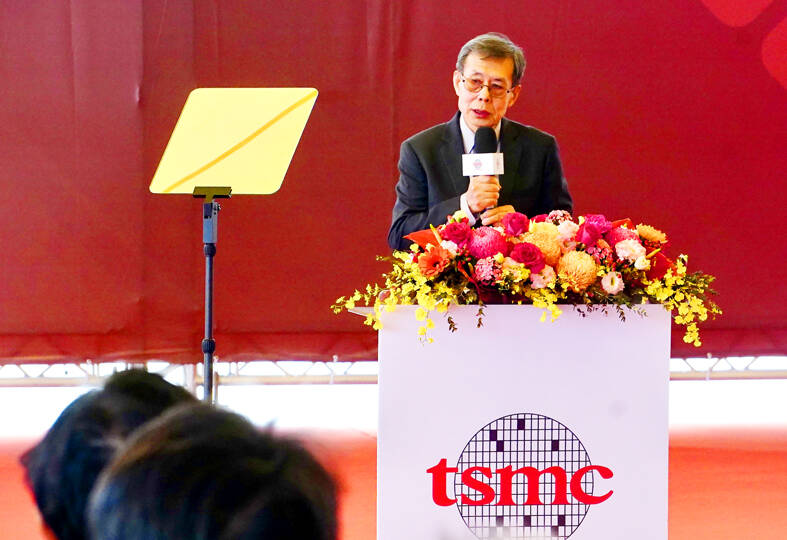Taiwan Semiconductor Manufacturing Co (TSMC, 台積電) yesterday said it is to invest a total of NT$1.5 trillion (US$45.2 billion) to expand its advanced 2-nanometer chip capacity in Kaohsiung, bolstering its commitment to augment investment and technology development at home.
The world’s biggest contract chipmaker unveiled the massive domestic investment after boosting its investment in the US by US$100 billion at the beginning of last month, fanning fears that Taiwan risks losing its competitive edge as TSMC plans to produce more advanced chips, including 2-nanometers, and set up a research and development center in the US for the first time.
TSMC yesterday held a capacity expansion ceremony at the construction site of its 2-nanometer fab, dubbed Fab 22, in Kaohsiung. The fab is to house five chip manufacturing facilities, with the first one set to enter volume production in the second half of this year, the company said in a statement.

Photo: CNA
“Today’s 2-nanometer capacity expansion ceremony holds significant importance for global semiconductor technology development, marking the successful progress of TSMC’s world-leading 2-nanometer process.
It showcases TSMC’s commitment to meeting strong market demand, continuously expanding capacity to support customers,” TSMC co-chief operating officer Y.P. Chyn (秦永沛) said at the ceremony.
“In Kaohsiung, we will have Phase 3, Phase 4 and Phase 5 wafer fabrication plants. All of them will germinate here,” Chyn said.
The chipmaker said it is currently installing equipment at the first phase of Fab 22 and has completed structural engineering works at Phase 2.
Government officials, including Premier Cho Jung-tai (卓榮泰), Kaohsiung Mayor Chen Chi-mai (陳其邁), Executive Yuan Secretary-General Kung Ming-hsin (龔明鑫) and Minister of Economic Affairs J.W. Kuo (郭智輝) attended the ceremony.
With NT$1.5 trillion in investment, Fab 22 would create more than 7,000 direct high-tech positions and 20,000 construction jobs, it said.
Aside from its revenue, TSMC generates about NT$3 trillion in production value a year and 500,000 jobs through its supply chain partners and related services, it said.
TSMC has also been holding intensive discussions with the authorities to acquire more land to build new chipmaking facilities, Chyn said.
The company said its 2-nanometer process technology is expected to be widely applied in customers’ next-generation leading technology products, including supercomputers, mobile devices and cloud-based data centers.
TSMC estimated that 2-nanometer technology would create end products with a market value of US$2 trillion within five years of volume production.
TSMC also has a 2-nanometer chip fab in Hsinchu, which is progressing as planned.
TSMC said almost all technology innovators in the world are closely collaborating with it to adopt 2-nanometer technology, given its 10 to 15 percent speed improvement and 25 to 30 percent lower power consumption compared with 3-nanometer technology.

A magnitude 5.6 earthquake struck off the coast of Yilan County at 12:37pm today, with clear shaking felt across much of northern Taiwan. There were no immediate reports of damage. The epicenter of the quake was 16.9km east-southeast of Yilan County Hall offshore at a depth of 66.8km, Central Weather Administration (CWA) data showed. The maximum intensity registered at a 4 in Yilan County’s Nanao Township (南澳) on Taiwan’s seven-tier scale. Other parts of Yilan, as well as certain areas of Hualien County, Taipei, New Taipei City, Taoyuan, Hsinchu County, Taichung and Miaoli County, recorded intensities of 3. Residents of Yilan County and Taipei received

Taiwan has secured another breakthrough in fruit exports, with jujubes, dragon fruit and lychees approved for shipment to the EU, the Ministry of Agriculture said yesterday. The Animal and Plant Health Inspection Agency on Thursday received formal notification of the approval from the EU, the ministry said, adding that the decision was expected to expand Taiwanese fruit producers’ access to high-end European markets. Taiwan exported 126 tonnes of lychees last year, valued at US$1.48 million, with Japan accounting for 102 tonnes. Other export destinations included New Zealand, Hong Kong, the US and Australia, ministry data showed. Jujube exports totaled 103 tonnes, valued at

BIG SPENDERS: Foreign investors bought the most Taiwan equities since 2005, signaling confidence that an AI boom would continue to benefit chipmakers Taiwan Semiconductor Manufacturing Co’s (TSMC, 台積電) market capitalization swelled to US$2 trillion for the first time following a 4.25 percent rally in its American depositary receipts (ADR) overnight, putting the world’s biggest contract chipmaker sixth on the list of the world’s biggest companies by market capitalization, just behind Amazon.com Inc. The site CompaniesMarketcap.com ranked TSMC ahead of Saudi Aramco and Meta Platforms Inc. The Taiwanese company’s ADRs on Tuesday surged to US$385.75 on the New York Stock Exchange, as strong demand for artificial intelligence (AI) applications led to chip supply constraints and boost revenue growth to record-breaking levels. Each TSMC ADR represents

TRUST: The KMT said it respected the US’ timing and considerations, and hoped it would continue to honor its commitments to helping Taiwan bolster its defenses and deterrence US President Donald Trump is delaying a multibillion-dollar arms sale to Taiwan to ensure his visit to Beijing is successful, a New York Times report said. The weapons sales package has stalled in the US Department of State, the report said, citing US officials it did not identify. The White House has told agencies not to push forward ahead of Trump’s meeting with Chinese President Xi Jinping (習近平), it said. The two last month held a phone call to discuss trade and geopolitical flashpoints ahead of the summit. Xi raised the Taiwan issue and urged the US to handle arms sales to